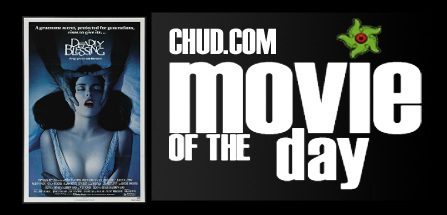
The Film: Deadly Blessing (1981)
The Principles: Directed by: Wes Craven. Written by: Glenn Benest, Matthew Barr. Starring: Maren Jensen, Sharon Stone, Susan Buckner, Lisa Hartman, Lois Nettleton, Ernest Borgnine, Michael Berryman
The Premise: When a former member of a religious cult dies in a mysterious accident, his wife Martha, who now lives alone and close to the cult’s church, begins to fear for her life and the lives of her visiting friends. Strange and deadly events begin to happen… Could she be the target of the evil cult and its fanatical leader Isaiah?
Is It Good?: Ye gods, yes. With the recent passing of Wes Craven (one of the big 4 prolific horror directors of the 70s and 80s alongside John Carpenter, David Cronenberg, and George A. Romero; they let Tobe Hooper hang too, but he has to sit in the middle of the back seat with his feet on the hump and his seat-belt doesn’t latch quite right and he has no idea where to put his elbows because there are no armrests, it’s awful) people are going to be going back through his filmography and thinking back to happier times when he was the master of horror and not the guy who made My Soul to Take. They’ll find a lot of lists of his classics but though they’ll list the obvious greats and overrated 90s crap, they’ll overlook a few gemes from his early career. Before you go for the comfort of Scream, New Nightmare, and Shocker, I invite you to take a look at this all-but-forgotten movie that was made between The Hills Have Eyes and Swamp Thing.
Deadly Blessing was a horror movie conceived by the rising popularity of The Amish, a religious group best known for their refusal to use modern technology (I’m oversimplifying, I know, this is a Movie of the Day, not an article on Amish belief structures and practices.) The dark ages sensibilities and fiercely religious practices of these people struck a chord with writers Glenn Benest and Matthew Barr who drafted a script for a horror movie involving a similar group known as The Hittites and Wes Craven, whose own childhood had been a road map of religious oppression, signed on to direct the movie.
It’s a slasher movie, but very unlike many of the time. Oh we still have a faceless killer stalking and killing people in punishment for sexual promiscuity, but the concept is turned on its head. Unlike many slashers of the era the killer doesn’t represent an absurd form of snooty morality, by killing those engaged in sexual activities it’s actually furthering the repression of everyone else. Susan Buckner’s Vicky Anderson is a sexual maven and her behavior patterns are those of the “slut” archetype in these movies, yet she’s played as the most down-to-earth and sensible of our three heroines. While there’s a fair amount of screaming in terror and a lot of skin shown, these women never feel like the typical scream queens, they’re characters first.
There aren’t a lot of kills and the few there are aren’t terribly inventive or spectacular, what works is the tension that builds up every time the killer is stalking. Scenes of the killer chasing a woman through a locked barn or a memorable bit with a snake in a bathtub are chilling and well staged. There are so many people who could be the killer and so many feints and fake-outs that it’s impossible to tell what’s a clue and what’s a red herring. The best thing about Deadly Blessing is something I can’t tell you about, because it would spoil the whole thing, but it’s very much a movie about repression and the way it builds until strong emotions take over and cause awful things to happen.
The ending is the only part that doesn’t really work. Deadly Blessing was released after Carrie and the studio wanted a last minute jump scare to try and capture the final moment of Brian de Palma’s film. The ending is scary but it’s tonally inappropriate to the message of the movie, taking it into a supernatural territory that’s not really present in the rest of the film, and feels tacked on.
Random Anecdotes:
Sharon Stone was an unknown actress when this movie was released.
This was the last role of Maren Jensen.
Once you know who the killer is, it’s interesting to go back and watch Michael Berryman’s character who takes on a whole new light when you’re in on what’s happening.
Cinematic Soulmates:
Slumber Party Massacre (1982), Sleepaway Camp (1983), Mother’s Day (1980)